Unit2 What time do you go to school? 单元综合复习课件(共23张PPT)
文档属性
| 名称 | Unit2 What time do you go to school? 单元综合复习课件(共23张PPT) | 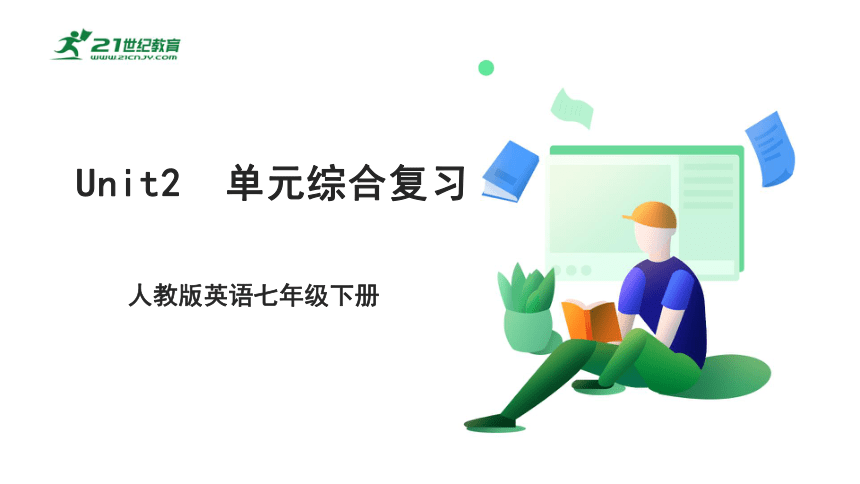 | |
| 格式 | zip | ||
| 文件大小 | 945.3KB | ||
| 资源类型 | 试卷 | ||
| 版本资源 | 人教新目标(Go for it)版 | ||
| 科目 | 英语 | ||
| 更新时间 | 2023-03-06 09:58:07 | ||
图片预览

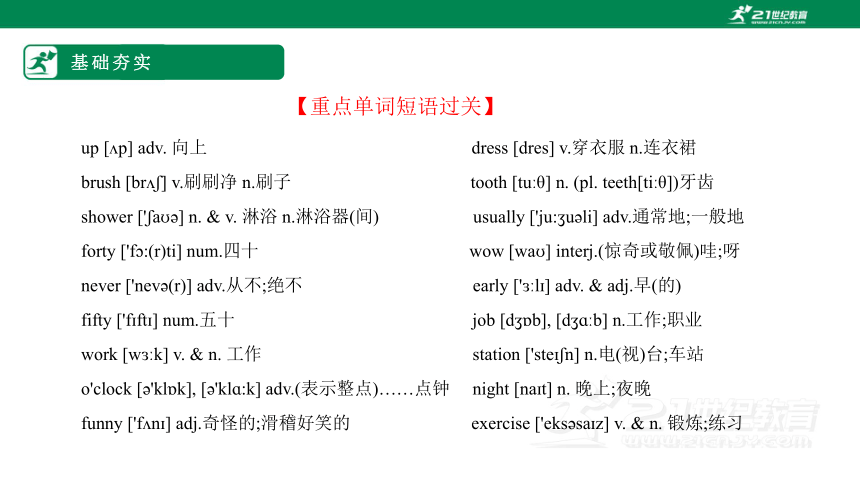
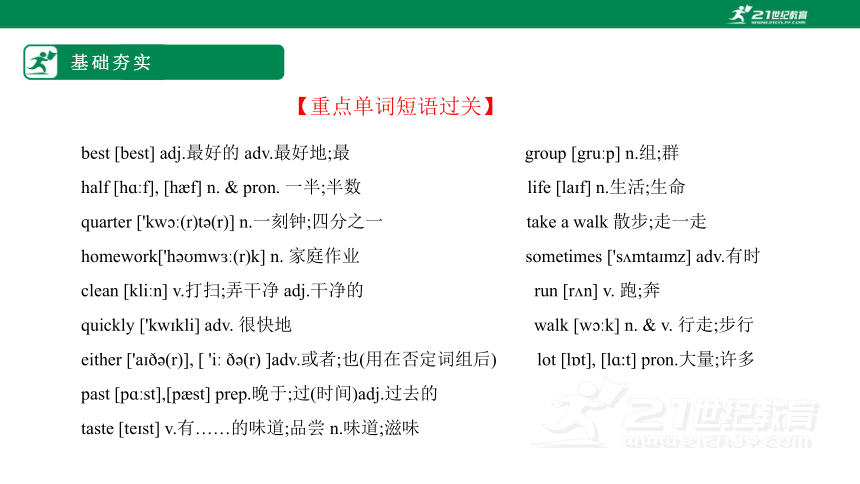
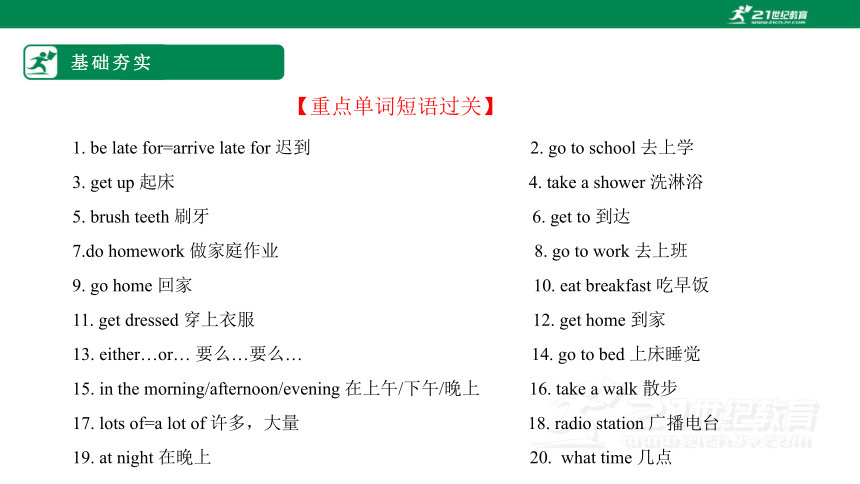
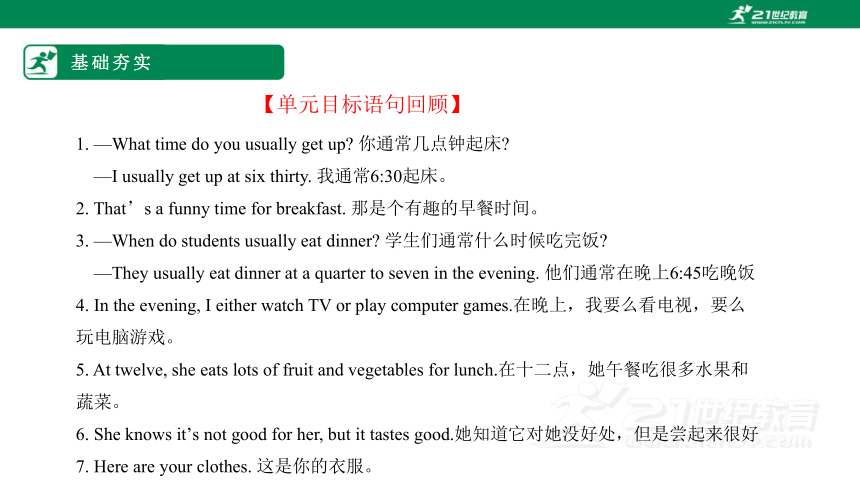

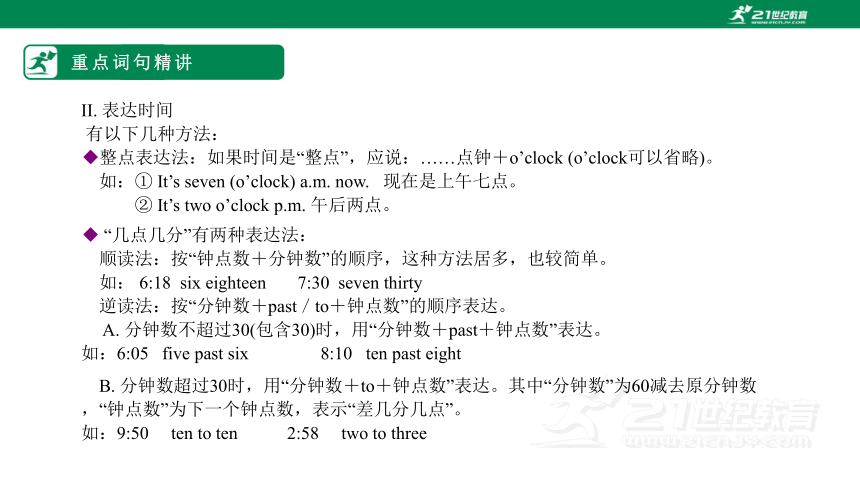
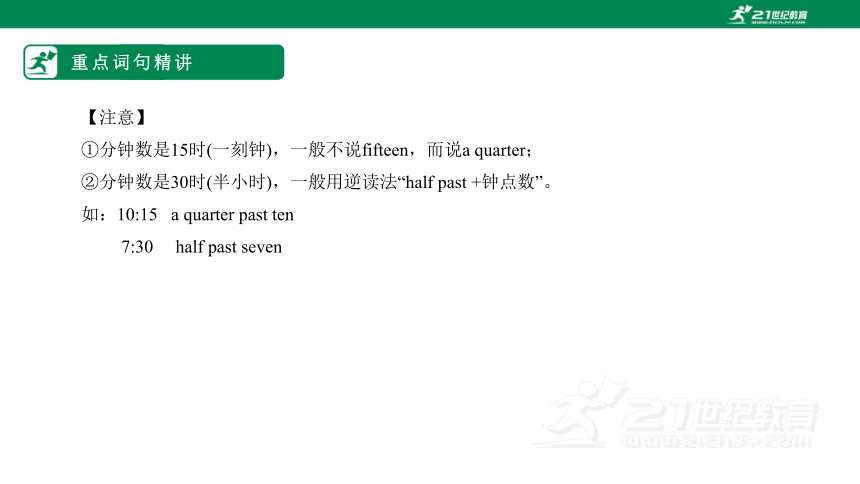
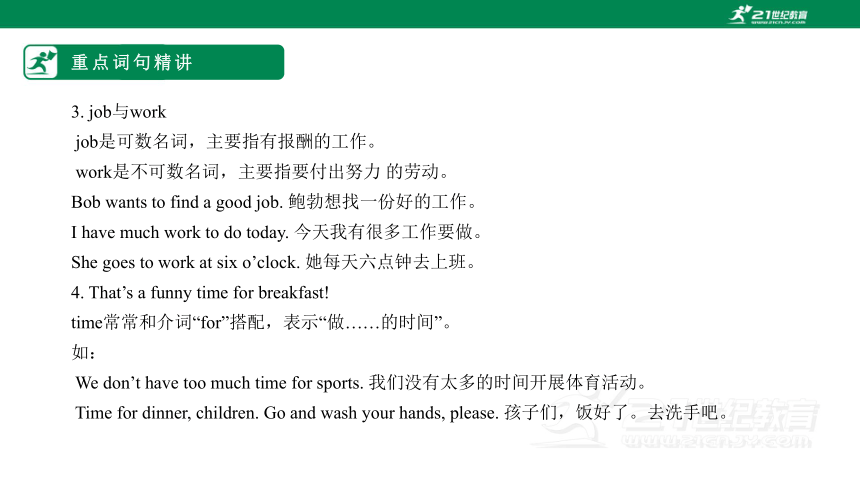
文档简介
(共23张PPT)
Unit2 单元综合复习
人教版英语七年级下册
基础夯实
up [ p] adv. 向上 dress [dres] v.穿衣服 n.连衣裙
brush [br ] v.刷刷净 n.刷子 tooth [tu θ] n. (pl. teeth[ti θ])牙齿
shower [' a ] n. & v. 淋浴 n.淋浴器(间) usually ['ju: u li] adv.通常地;一般地
forty ['f :(r)ti] num.四十 wow [wa ] interj.(惊奇或敬佩)哇;呀
never ['nev (r)] adv.从不;绝不 early [' l ] adv. & adj.早(的)
fifty ['f ft ] num.五十 job [d b], [d ɑ b] n.工作;职业
work [w k] v. & n. 工作 station ['ste n] n.电(视)台;车站
o'clock [ 'kl k], [ 'klɑ:k] adv.(表示整点)……点钟 night [na t] n. 晚上;夜晚
funny ['f n ] adj.奇怪的;滑稽好笑的 exercise ['eks sa z] v. & n. 锻炼;练习
【重点单词短语过关】
基础夯实
best [best] adj.最好的 adv.最好地;最 group [gru p] n.组;群
half [hɑ f], [h f] n. & pron. 一半;半数 life [la f] n.生活;生命
quarter ['kw (r)t (r)] n.一刻钟;四分之一 take a walk 散步;走一走
homework['h mw (r)k] n. 家庭作业 sometimes ['s mta mz] adv.有时
clean [kli n] v.打扫;弄干净 adj.干净的 run [r n] v. 跑;奔
quickly ['kw kli] adv. 很快地 walk [w k] n. & v. 行走;步行
either ['a (r)], [ 'i (r) ]adv.或者;也(用在否定词组后) lot [l t], [lɑ:t] pron.大量;许多
past [pɑ st],[p st] prep.晚于;过(时间)adj.过去的
taste [te st] v.有……的味道;品尝 n.味道;滋味
【重点单词短语过关】
基础夯实
1. be late for=arrive late for 迟到 2. go to school 去上学
3. get up 起床 4. take a shower 洗淋浴
5. brush teeth 刷牙 6. get to 到达
7.do homework 做家庭作业 8. go to work 去上班
9. go home 回家 10. eat breakfast 吃早饭
11. get dressed 穿上衣服 12. get home 到家
13. either…or… 要么…要么… 14. go to bed 上床睡觉
15. in the morning/afternoon/evening 在上午/下午/晚上 16. take a walk 散步
17. lots of=a lot of 许多,大量 18. radio station 广播电台
19. at night 在晚上 20. what time 几点
【重点单词短语过关】
基础夯实
1. —What time do you usually get up 你通常几点钟起床
—I usually get up at six thirty. 我通常6:30起床。
2. That’s a funny time for breakfast. 那是个有趣的早餐时间。
3. —When do students usually eat dinner 学生们通常什么时候吃完饭
—They usually eat dinner at a quarter to seven in the evening. 他们通常在晚上6:45吃晚饭
4. In the evening, I either watch TV or play computer games.在晚上,我要么看电视,要么玩电脑游戏。
5. At twelve, she eats lots of fruit and vegetables for lunch.在十二点,她午餐吃很多水果和蔬菜。
6. She knows it’s not good for her, but it tastes good.她知道它对她没好处,但是尝起来很好
7. Here are your clothes. 这是你的衣服。
【单元目标语句回顾】
重点词句精讲
1. What time do you usually get up, Rick
what time与when都可用于询问时间。但what time所问的时间范围较小, 一般询问比较精确的时间;而when(什么时候) 所问的时间范围比what time要大,可询问小的时间点, 也可询问日期。
例如:What time / When do you usually have breakfast 你通常几点/什么时候吃早饭?
When is Teachers’ Day 教师节是什么时候?
2. 询问时间和表达时间的方法:
I. 询问时间
What’s the time
What time is it 来询问时间,有时也可用
Do you know the time
回答方式均用It’s...
如:-What time is it 几点了?-It’s seven o’clock.七点。
重点词句精讲
II. 表达时间
有以下几种方法:
整点表达法:如果时间是“整点”,应说:……点钟+o’clock (o’clock可以省略)。
如:① It’s seven (o’clock) a.m. now. 现在是上午七点。
② It’s two o’clock p.m. 午后两点。
“几点几分”有两种表达法:
顺读法:按“钟点数+分钟数”的顺序,这种方法居多,也较简单。
如: 6:18 six eighteen 7:30 seven thirty
逆读法:按“分钟数+past/to+钟点数”的顺序表达。
A. 分钟数不超过30(包含30)时,用“分钟数+past+钟点数”表达。
如:6:05 five past six 8:10 ten past eight
B. 分钟数超过30时,用“分钟数+to+钟点数”表达。其中“分钟数”为60减去原分钟数,“钟点数”为下一个钟点数,表示“差几分几点”。
如:9:50 ten to ten 2:58 two to three
重点词句精讲
【注意】
①分钟数是15时(一刻钟),一般不说fifteen,而说a quarter;
②分钟数是30时(半小时),一般用逆读法“half past +钟点数”。
如:10:15 a quarter past ten
7:30 half past seven
重点词句精讲
3. job与work
job是可数名词,主要指有报酬的工作。
work是不可数名词,主要指要付出努力 的劳动。
Bob wants to find a good job. 鲍勃想找一份好的工作。
I have much work to do today. 今天我有很多工作要做。
She goes to work at six o’clock. 她每天六点钟去上班。
4. That’s a funny time for breakfast!
time常常和介词“for”搭配,表示“做……的时间”。
如:
We don’t have too much time for sports. 我们没有太多的时间开展体育活动。
Time for dinner, children. Go and wash your hands, please. 孩子们,饭好了。去洗手吧。
重点词句精讲
5. exercise 的用法小结
作动词,意为“锻炼”。
如:His grandpa exercises in the morning. 他爷爷每天早晨锻炼。
作不可数名词,意为“锻炼;运动”
如:He does about fifteen minutes’ exercise every day. 每天他都做大约十五分钟的运动。
6. station 意为“电(视)台;车站”
如: TV station 电视台
bus station 公交车站
7. He gets home at 7:00... 他7点钟到家……
“get to + 地点名词”意为“到达某地”。
e.g. get to school 到校
但get 后接副词时不能有to, 句中的home是副词,因此不用to。
重点词句精讲
8.quickly意为“快速地”,是副词,修饰动词。
The dog runs quickly. 小狗快速地跑了。
Don’t eat quickly. It’s not a good habit.别吃得太快,这不是个好习惯。
【拓展】:
quick adj. ,快的;迅速的。
Tom eats a quick breakfast, then goes to school.汤姆快速吃完早饭,然后就去上学了。
重点词句精讲
9. either… or… 意为“或者……或者…… ” 连接两个并列名词、代词或句子成份。
Jack eats either hamburgers or sandwiches for lunch. 杰克或者吃汉堡或者吃三明治作
午饭。
You can either play chess or play the guitar. 你可以下棋或者弹吉它。
当either…or…连接两个名词作主语时,谓语动词的时态和数应与最近的一个相匹配。
Either you or he is right. 不是你对就是他对。
重点词句精讲
10. She knows it’s not good for her, butit tastes good!
1) be good for …表示“对……有益;对…… 有好处”;
be bad for…表示“对……有害;对…… 有坏处”。
It’s good for our health to go to bed earlyand get up early.早睡早起对我们的健康有好处。
Don’t read in the dark. It’s bad for your eyes. 不要在暗处看书,这对你的眼睛有害。
2) taste 意为“品尝 …… 的味道”。是连系动词,后面常跟形容词。
Apples taste good. 苹果尝起来味道很好。
Does the ice-cream taste nice 冰淇淋的味道尝起来很好吗?
【拓展】:taste作名词,意为“味道”。
The ice-cream has a taste of lemon. 冰淇淋有点柠檬的味道。
语法知识精讲
一.频度副词用法
不确定时间的副词:always(总是),often(经常),usually(通常),sometimes(有时),seldom(很少),never(从不)等,这些副词表频度,表示经常性或习惯性的行为。
频度副词的用法
1. always是频度最大的词,意为“总是;永远”。
I always remember my first day at school.我将永远记住我上学的第一天。
2.usually意为“通常”,即很少例外,频度仅次always。
What do you usually have for breakfast 你通常早餐吃什么?
语法知识精讲
3. often 意为“经常”,在频度上不如usually那么频繁。
Li Ping often does his homework in the afternoon.李平经常在下午做作业。
4. sometimes意为“有时候”,频度比often小,表示动作偶尔发生,间断较大。既可以放在be动词、助动词之后,行为动词之前,也可以放在句首,还可以放在句尾。
I sometimes go to the library.我有时去图书馆。
Sometimes I read a book in the evening.我有时在晚上看书。
5. never 从未;永不;决不。
I have never been there. 我从未到过那里。
语法知识精讲
频度副词在句中的位置
频度副词在句中习惯上位于be动词之后、行为动词之前、助动词之后。
She is often late for school.她上学经常迟到。
He usually goes to bed at about 12.他通常(午夜)十二点钟睡觉。
When do you usually get up in the morning 早上你通常什么时候起床?
He never has anything to do. 他一向无所事事。
实战演练
一、用所给词的适当形式填空。
1.Tom usually ________(go) to school at 7:15.
2.She gets ________(dress) at 6:45.
3.What time do you brush _________(tooth)
4.Do you take a _________(show) every morning
5.—What _______ Jack _____(do) on Sunday evening
—He usually ________(watch) TV with his parents.
【答案】1.goes 2.dressed 3.teeth 4.shower 5.does do watched
实战演练
二、根据句意及汉语或首字母提示写单词。
6.My sister get p_______ at 6:30 a.m.
7.I get u________ at 5:30 a.m.
8.I _______ (通常) have breakfast with my parents at home.
9.Our English teacher Mr. Green is _________ (四十) years old.
10.My brother has fo ur ________ (牙齿) now.
11.People think cats have nine _________ (生命).
12.I don't like this picture,and my friend doesn't like it,________ (也).
13.Mr.Brown always walks very ________ (很快地).
14.The ice cream ________ (吃起来) good.
15.________ (有时) I go to the old people's home with my classmates.
【答案】6.pressed 7.up 8.usually 9.forty 10.teeth 11.lives 12.either 13.quickly
14.tastes 15.Sometimes
实战演练
三、单项选择。
16.I'm afraid (恐怕) I can't with you.I have ____ homework to do.
A.lots of B.many C.a set of D.lot of
17.__ __ dinner,I usually eat ____.
A.For;vegetable B.For;vegetables
C.At;hamburger D.For;hamburger
18.Music is good ____ our life, and my friend Lily is good ____ music.
A.at, for B.for, at
C.with, for D.at, with
19.Lingling likes apples because they ____ good.
A.get B.look C.sound D.taste
20.Either you or your sister ____ the house in the afternoon.
A.clean B.to clean C.cleans D.cleaning
【答案】ABBDC
实战演练
四、根据汉语意思完成句子。
21.你有很多时间来读这个故事。
You have _______ ________for the story.
22.下课后,琳达要么听音乐,要么做游戏。
Linda ______ listens to music ____ plays games after class.
23.艾丽斯从来不在早上锻炼。
Alice ________ __________in the morning.
24.你每天早饭吃得好吗?
Do you have ____ _______ __________ every day
25.下个学期我们有许多校园活动。
We have ____ _____school activities next term.
【答案】21.much time 22. either or 23. never exercises 24. a good breakfast 25.lots of
That's all.Thank you!
谢谢
21世纪教育网(www.21cnjy.com)
中小学教育资源网站
兼职招聘:
https://www.21cnjy.com/recruitment/home/admin
Unit2 单元综合复习
人教版英语七年级下册
基础夯实
up [ p] adv. 向上 dress [dres] v.穿衣服 n.连衣裙
brush [br ] v.刷刷净 n.刷子 tooth [tu θ] n. (pl. teeth[ti θ])牙齿
shower [' a ] n. & v. 淋浴 n.淋浴器(间) usually ['ju: u li] adv.通常地;一般地
forty ['f :(r)ti] num.四十 wow [wa ] interj.(惊奇或敬佩)哇;呀
never ['nev (r)] adv.从不;绝不 early [' l ] adv. & adj.早(的)
fifty ['f ft ] num.五十 job [d b], [d ɑ b] n.工作;职业
work [w k] v. & n. 工作 station ['ste n] n.电(视)台;车站
o'clock [ 'kl k], [ 'klɑ:k] adv.(表示整点)……点钟 night [na t] n. 晚上;夜晚
funny ['f n ] adj.奇怪的;滑稽好笑的 exercise ['eks sa z] v. & n. 锻炼;练习
【重点单词短语过关】
基础夯实
best [best] adj.最好的 adv.最好地;最 group [gru p] n.组;群
half [hɑ f], [h f] n. & pron. 一半;半数 life [la f] n.生活;生命
quarter ['kw (r)t (r)] n.一刻钟;四分之一 take a walk 散步;走一走
homework['h mw (r)k] n. 家庭作业 sometimes ['s mta mz] adv.有时
clean [kli n] v.打扫;弄干净 adj.干净的 run [r n] v. 跑;奔
quickly ['kw kli] adv. 很快地 walk [w k] n. & v. 行走;步行
either ['a (r)], [ 'i (r) ]adv.或者;也(用在否定词组后) lot [l t], [lɑ:t] pron.大量;许多
past [pɑ st],[p st] prep.晚于;过(时间)adj.过去的
taste [te st] v.有……的味道;品尝 n.味道;滋味
【重点单词短语过关】
基础夯实
1. be late for=arrive late for 迟到 2. go to school 去上学
3. get up 起床 4. take a shower 洗淋浴
5. brush teeth 刷牙 6. get to 到达
7.do homework 做家庭作业 8. go to work 去上班
9. go home 回家 10. eat breakfast 吃早饭
11. get dressed 穿上衣服 12. get home 到家
13. either…or… 要么…要么… 14. go to bed 上床睡觉
15. in the morning/afternoon/evening 在上午/下午/晚上 16. take a walk 散步
17. lots of=a lot of 许多,大量 18. radio station 广播电台
19. at night 在晚上 20. what time 几点
【重点单词短语过关】
基础夯实
1. —What time do you usually get up 你通常几点钟起床
—I usually get up at six thirty. 我通常6:30起床。
2. That’s a funny time for breakfast. 那是个有趣的早餐时间。
3. —When do students usually eat dinner 学生们通常什么时候吃完饭
—They usually eat dinner at a quarter to seven in the evening. 他们通常在晚上6:45吃晚饭
4. In the evening, I either watch TV or play computer games.在晚上,我要么看电视,要么玩电脑游戏。
5. At twelve, she eats lots of fruit and vegetables for lunch.在十二点,她午餐吃很多水果和蔬菜。
6. She knows it’s not good for her, but it tastes good.她知道它对她没好处,但是尝起来很好
7. Here are your clothes. 这是你的衣服。
【单元目标语句回顾】
重点词句精讲
1. What time do you usually get up, Rick
what time与when都可用于询问时间。但what time所问的时间范围较小, 一般询问比较精确的时间;而when(什么时候) 所问的时间范围比what time要大,可询问小的时间点, 也可询问日期。
例如:What time / When do you usually have breakfast 你通常几点/什么时候吃早饭?
When is Teachers’ Day 教师节是什么时候?
2. 询问时间和表达时间的方法:
I. 询问时间
What’s the time
What time is it 来询问时间,有时也可用
Do you know the time
回答方式均用It’s...
如:-What time is it 几点了?-It’s seven o’clock.七点。
重点词句精讲
II. 表达时间
有以下几种方法:
整点表达法:如果时间是“整点”,应说:……点钟+o’clock (o’clock可以省略)。
如:① It’s seven (o’clock) a.m. now. 现在是上午七点。
② It’s two o’clock p.m. 午后两点。
“几点几分”有两种表达法:
顺读法:按“钟点数+分钟数”的顺序,这种方法居多,也较简单。
如: 6:18 six eighteen 7:30 seven thirty
逆读法:按“分钟数+past/to+钟点数”的顺序表达。
A. 分钟数不超过30(包含30)时,用“分钟数+past+钟点数”表达。
如:6:05 five past six 8:10 ten past eight
B. 分钟数超过30时,用“分钟数+to+钟点数”表达。其中“分钟数”为60减去原分钟数,“钟点数”为下一个钟点数,表示“差几分几点”。
如:9:50 ten to ten 2:58 two to three
重点词句精讲
【注意】
①分钟数是15时(一刻钟),一般不说fifteen,而说a quarter;
②分钟数是30时(半小时),一般用逆读法“half past +钟点数”。
如:10:15 a quarter past ten
7:30 half past seven
重点词句精讲
3. job与work
job是可数名词,主要指有报酬的工作。
work是不可数名词,主要指要付出努力 的劳动。
Bob wants to find a good job. 鲍勃想找一份好的工作。
I have much work to do today. 今天我有很多工作要做。
She goes to work at six o’clock. 她每天六点钟去上班。
4. That’s a funny time for breakfast!
time常常和介词“for”搭配,表示“做……的时间”。
如:
We don’t have too much time for sports. 我们没有太多的时间开展体育活动。
Time for dinner, children. Go and wash your hands, please. 孩子们,饭好了。去洗手吧。
重点词句精讲
5. exercise 的用法小结
作动词,意为“锻炼”。
如:His grandpa exercises in the morning. 他爷爷每天早晨锻炼。
作不可数名词,意为“锻炼;运动”
如:He does about fifteen minutes’ exercise every day. 每天他都做大约十五分钟的运动。
6. station 意为“电(视)台;车站”
如: TV station 电视台
bus station 公交车站
7. He gets home at 7:00... 他7点钟到家……
“get to + 地点名词”意为“到达某地”。
e.g. get to school 到校
但get 后接副词时不能有to, 句中的home是副词,因此不用to。
重点词句精讲
8.quickly意为“快速地”,是副词,修饰动词。
The dog runs quickly. 小狗快速地跑了。
Don’t eat quickly. It’s not a good habit.别吃得太快,这不是个好习惯。
【拓展】:
quick adj. ,快的;迅速的。
Tom eats a quick breakfast, then goes to school.汤姆快速吃完早饭,然后就去上学了。
重点词句精讲
9. either… or… 意为“或者……或者…… ” 连接两个并列名词、代词或句子成份。
Jack eats either hamburgers or sandwiches for lunch. 杰克或者吃汉堡或者吃三明治作
午饭。
You can either play chess or play the guitar. 你可以下棋或者弹吉它。
当either…or…连接两个名词作主语时,谓语动词的时态和数应与最近的一个相匹配。
Either you or he is right. 不是你对就是他对。
重点词句精讲
10. She knows it’s not good for her, butit tastes good!
1) be good for …表示“对……有益;对…… 有好处”;
be bad for…表示“对……有害;对…… 有坏处”。
It’s good for our health to go to bed earlyand get up early.早睡早起对我们的健康有好处。
Don’t read in the dark. It’s bad for your eyes. 不要在暗处看书,这对你的眼睛有害。
2) taste 意为“品尝 …… 的味道”。是连系动词,后面常跟形容词。
Apples taste good. 苹果尝起来味道很好。
Does the ice-cream taste nice 冰淇淋的味道尝起来很好吗?
【拓展】:taste作名词,意为“味道”。
The ice-cream has a taste of lemon. 冰淇淋有点柠檬的味道。
语法知识精讲
一.频度副词用法
不确定时间的副词:always(总是),often(经常),usually(通常),sometimes(有时),seldom(很少),never(从不)等,这些副词表频度,表示经常性或习惯性的行为。
频度副词的用法
1. always是频度最大的词,意为“总是;永远”。
I always remember my first day at school.我将永远记住我上学的第一天。
2.usually意为“通常”,即很少例外,频度仅次always。
What do you usually have for breakfast 你通常早餐吃什么?
语法知识精讲
3. often 意为“经常”,在频度上不如usually那么频繁。
Li Ping often does his homework in the afternoon.李平经常在下午做作业。
4. sometimes意为“有时候”,频度比often小,表示动作偶尔发生,间断较大。既可以放在be动词、助动词之后,行为动词之前,也可以放在句首,还可以放在句尾。
I sometimes go to the library.我有时去图书馆。
Sometimes I read a book in the evening.我有时在晚上看书。
5. never 从未;永不;决不。
I have never been there. 我从未到过那里。
语法知识精讲
频度副词在句中的位置
频度副词在句中习惯上位于be动词之后、行为动词之前、助动词之后。
She is often late for school.她上学经常迟到。
He usually goes to bed at about 12.他通常(午夜)十二点钟睡觉。
When do you usually get up in the morning 早上你通常什么时候起床?
He never has anything to do. 他一向无所事事。
实战演练
一、用所给词的适当形式填空。
1.Tom usually ________(go) to school at 7:15.
2.She gets ________(dress) at 6:45.
3.What time do you brush _________(tooth)
4.Do you take a _________(show) every morning
5.—What _______ Jack _____(do) on Sunday evening
—He usually ________(watch) TV with his parents.
【答案】1.goes 2.dressed 3.teeth 4.shower 5.does do watched
实战演练
二、根据句意及汉语或首字母提示写单词。
6.My sister get p_______ at 6:30 a.m.
7.I get u________ at 5:30 a.m.
8.I _______ (通常) have breakfast with my parents at home.
9.Our English teacher Mr. Green is _________ (四十) years old.
10.My brother has fo ur ________ (牙齿) now.
11.People think cats have nine _________ (生命).
12.I don't like this picture,and my friend doesn't like it,________ (也).
13.Mr.Brown always walks very ________ (很快地).
14.The ice cream ________ (吃起来) good.
15.________ (有时) I go to the old people's home with my classmates.
【答案】6.pressed 7.up 8.usually 9.forty 10.teeth 11.lives 12.either 13.quickly
14.tastes 15.Sometimes
实战演练
三、单项选择。
16.I'm afraid (恐怕) I can't with you.I have ____ homework to do.
A.lots of B.many C.a set of D.lot of
17.__ __ dinner,I usually eat ____.
A.For;vegetable B.For;vegetables
C.At;hamburger D.For;hamburger
18.Music is good ____ our life, and my friend Lily is good ____ music.
A.at, for B.for, at
C.with, for D.at, with
19.Lingling likes apples because they ____ good.
A.get B.look C.sound D.taste
20.Either you or your sister ____ the house in the afternoon.
A.clean B.to clean C.cleans D.cleaning
【答案】ABBDC
实战演练
四、根据汉语意思完成句子。
21.你有很多时间来读这个故事。
You have _______ ________for the story.
22.下课后,琳达要么听音乐,要么做游戏。
Linda ______ listens to music ____ plays games after class.
23.艾丽斯从来不在早上锻炼。
Alice ________ __________in the morning.
24.你每天早饭吃得好吗?
Do you have ____ _______ __________ every day
25.下个学期我们有许多校园活动。
We have ____ _____school activities next term.
【答案】21.much time 22. either or 23. never exercises 24. a good breakfast 25.lots of
That's all.Thank you!
谢谢
21世纪教育网(www.21cnjy.com)
中小学教育资源网站
兼职招聘:
https://www.21cnjy.com/recruitment/home/admin
同课章节目录
- Unit 1 Can you play the guitar?
- Section A
- Section B
- Unit 2 What time do you go to school?
- Section A
- Section B
- Unit 3 How do you get to school?
- Section A
- Section B
- Unit 4 Don't eat in class.
- Section A
- Section B
- Unit 5 Why do you like pandas?
- Section A
- Section B
- Unit 6 I'm watching TV.
- Section A
- Section B
- Review of Units 1-6
- Unit 7 It's raining!
- Section A
- Section B
- Unit 8 Is there a post office near here?
- Section A
- Section B
- Unit 9 What does he look like?
- Section A
- Section B
- Unit 10 I'd like some noodles.
- Section A
- Section B
- Unit 11 How was your school trip?
- Section A
- Section B
- Unit 12 What did you do last weekend?
- Section A
- Section B
